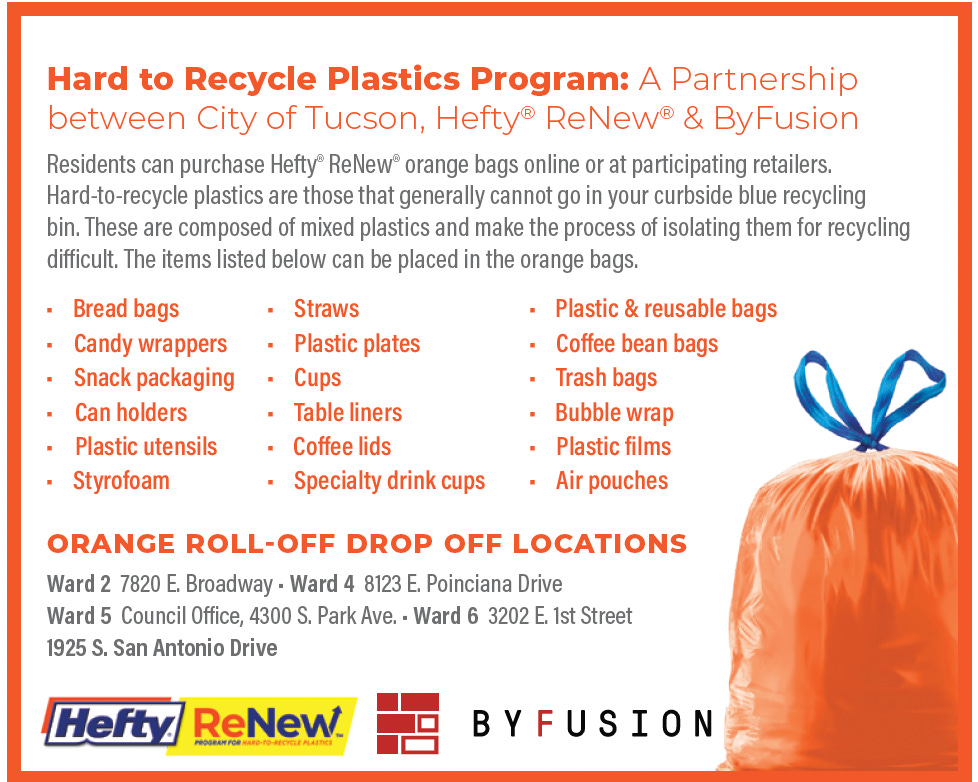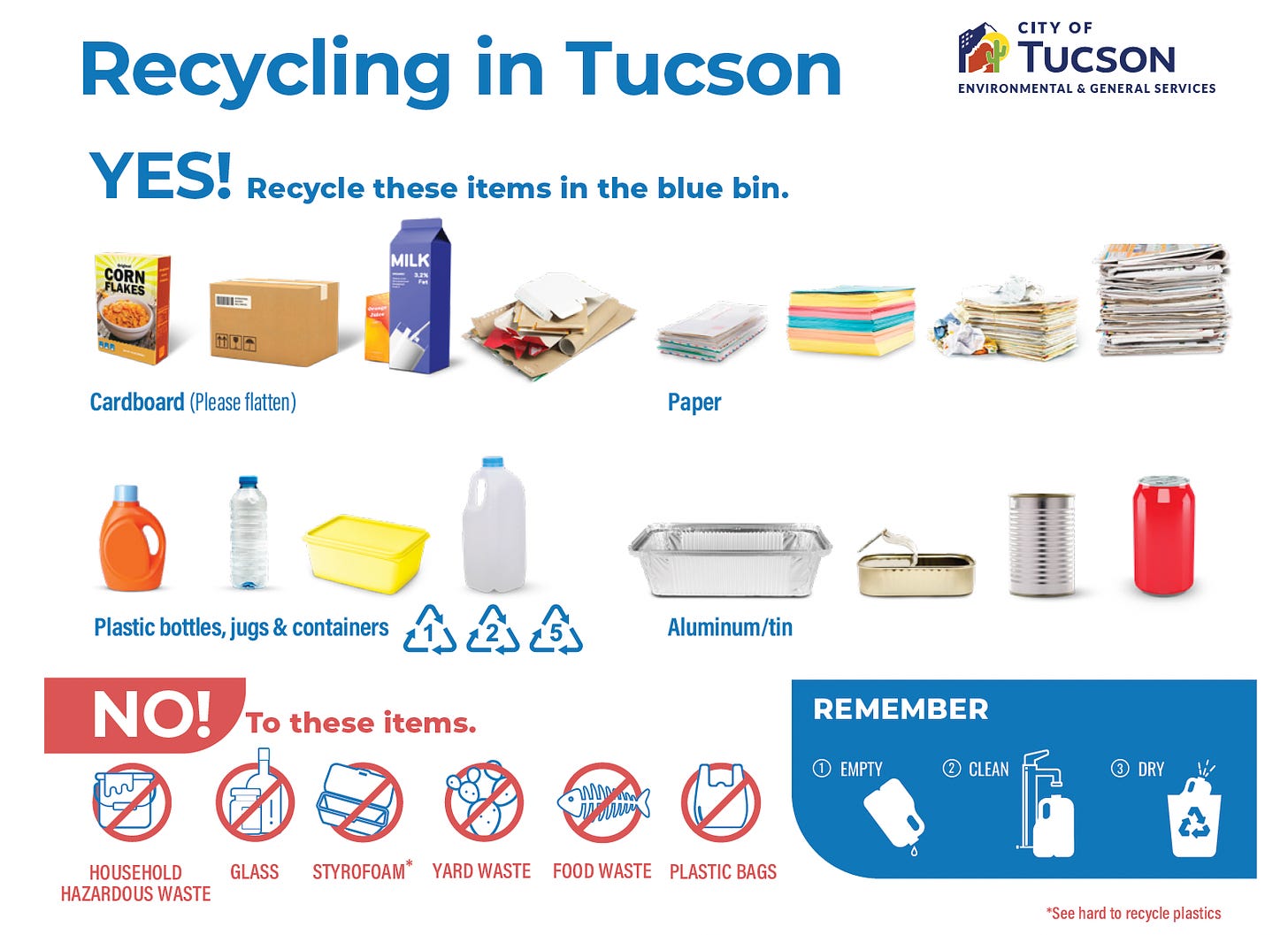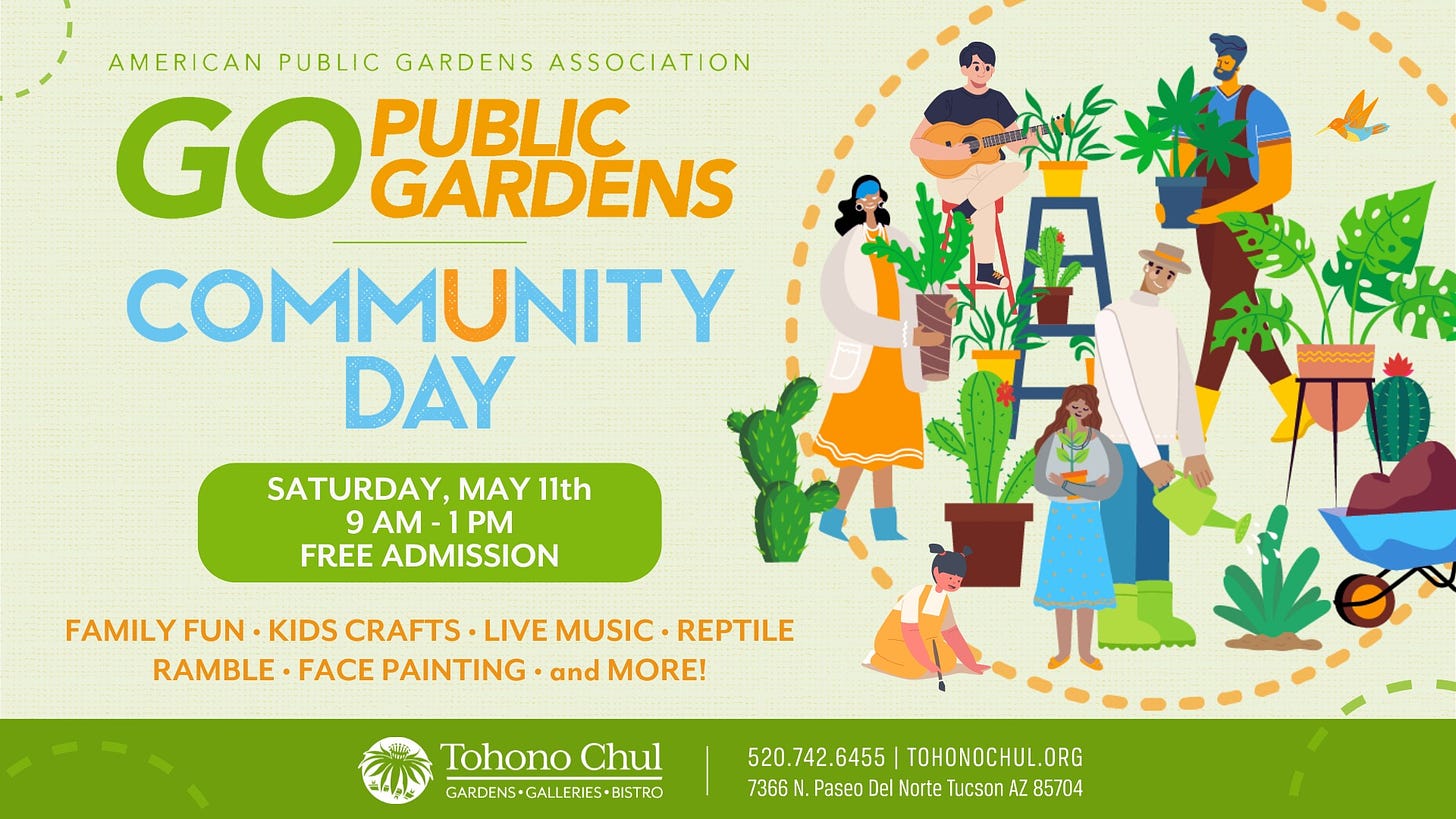The Climate Agenda: Too much of a good thing?
The response to the city's hard-to-recycle plastics program has been big ... So big, it’s partnering with Hefty to help deal with the excess ... Constable calls it quits.
Tucsonans are big on green initiatives, but the popularity of the city’s hard-to-recycle plastics program has created a big problem.
The issue is dozens of tons of plastic packaging, bagged up and sitting at the Los Reales Sustainability Campus where amidst rising temperatures and exposure to the sun, it’s started to break down.
The good news is that people are taking the time to bag and drop off all that plastic so it doesn’t end up in the landfill, but the bad news is, it’s making its way there anyhow. That’s because residents are dropping off way more plastic than manufacturing company ByFusion is able to convert to construction-grade blocks.
To deal with the surplus, the City of Tucson has partnered with Reynolds to become the newest Hefty ReNew program site. The program aims to repurpose plastics and keep them out of landfills and does this with nearly 80% of the materials that it collects.
Under the city’s expanded plastics program, ByFusion is still the priority partner and will get first dibs on all the plastic that’s collected. The rest will go to Hefty in the hopes that it will be recycled or repurposed.
City officials say the new partnership addresses the problem and is a win-win, since it doesn’t cost the city or taxpayers any money.
But one person who is deeply invested in the program calls the new arrangement a bait and switch and says that most of the plastic collected by Hefty will be incinerated in a waste-to-energy process.
“I don’t believe that’s what people signed up for when I started this program two years ago,” former City Councilman Steve Kozachik told the Tucson Agenda in an email.
The hard-to-recycle plastics program launched as a pilot in August 2022, allowing residents to drop off plastic packaging and wrappers that can’t be recycled in curbside blue bins at a big, orange dumpster outside former Kozachik’s Ward 6 office.
From there, the plastic would be sent to the Los Angeles-based company ByFusion and turned into construction-grade blocks that would be shipped back to Tucson and used to build planters, park benches and other small projects. The program eclipsed its early goals and expanded beyond the pilot phase. The city signed a four-year agreement with ByFusion and made plans for it to build a processing facility in Tucson and scale up the program to a city-wide service.
Until the facility is completed, five drop-off sites have been established around town and as of mid-March, more than 240 tons of plastic had been collected.
“People have really enthusiastically supported this program. So much that we have way more than what ByFusion can use,” said Cristina Polsgrove, public information officer for the city’s environmental services. “Unfortunately, some of it is sitting at the landfill and starting to break down because it’s been sitting out in the sun. And we don’t really want to have a lot of plastic just sitting around, waiting.”
Polsgrove first heard about the Hefty ReNew program last year, and its ability to divert hard-to-recycle plastics to multiple end markets. She thought it would be a good solution to handle the excess plastic that’s accumulating and brought the idea back to city officials. Because there’s no need for a contract and no cost to the city or taxpayers, the process moved quickly.
Environmental Services will hold a town hall next month to update the community on details of the expanded program, but it’s pretty straightforward: Residents will use clear bags or orange Hefty ReNew bags (available for purchase at more than a dozen locations around town) to collect hard-to-recycle plastics.
They’ll take those bags to one of five orange bins located around town and from there, it will be collected by city staffers and taken to Freedman Recycling to be bailed up and shipped. ByFusion still gets first dibs on the plastic, but once it has all it needs, the extra can be sent off to other markets.
One big change to the program is that the orange bags can also be used for Styrofoam collection, which isn’t the case with clear bags.
Officials are hoping the expanded program will help to address the high contamination rate, which Polsgrove said is upwards of 25%.
“People are putting all kinds of plastics in the orange bins, and that’s really not the case. We don’t want commercial or industrial waste, and that’s the biggest reason why we’re seeing so much contamination,” Polsgrove said. “And we’re looking for things that don’t go in blue bins. Things like grocery bags, snack bags and packaging.”
Items like milk jugs and detergent bottles should still be placed into blue bins for recycling.
“A couple of the other biggest issues were car parts and another was PVC sheets. One business dropped off 4,300 pounds of them and that mixed with household stuff doesn’t work,” Polsgrove said. “We really want to emphasize that the orange bins are for things that come out of homes.”
Kozachik acknowledges that the accumulating plastic is a problem, but said that he doesn’t think this is the solution and believes ByFusion will become an afterthought.
“Getting tied up with a subsidiary of Reynolds and hoping they give a damn about little startup ByFusion in a year and will voluntarily walk away from selling their bags and burning the plastic is a pipe dream,” he said. “That's not how the corporate world works now, and it won't be once they've become used to cashing checks for the sales and bragging on how environmentally conscious they are.”
Calling it quits: Constable Oscar Vasquez resigned this week, after the Pima County Board of Supervisors suspended him in January for the rest of his term, the Tucson Sentinel’s Jim Nintzel reports. A state ethics board stripped Vasquez of his responsibilities after a complaint that he didn’t work from April to September. The county supervisors will appoint a replacement. The only other person running for the office is Tracy Ethridge-Nielsen, a Democrat like Vasquez.
Casita rules: A bill is making its way through the state Legislature that would require cities to allow homeowners to build casitas on their property, Capitol Media Services’ Bob Christie reports. The measure passed the state Senate on Wednesday, but city officials oppose it, partly because it doesn’t block homeowners from using the casitas, or accessory dwelling units, as AirBnBs or other short-term rentals. The measure would override any conflicting parts of the rules approved by officials in Tucson and Phoenix.
Time for a cleanup: The tenants’ rights group Amphi Panteras are trying to get the landlord at Malibu Apartments, on First and Prince, to clean up apartments, some of which have mice, cockroaches, even grass growing inside, Arizona Public Media’s Cáit NíSíomón reports in a documentary. Hassan Clement created the Amphi Panteras two years ago after a property manager refused to make repairs at an apartment complex, including a broken air conditioner during a heat wave. He knocked on doors and found 16 people who had similar complaints. They met with officials from Ward 3 and then went on to form a union.
Coming and going: An Oro Valley author, Cynthia Harmony, was inspired by butterflies when she wrote children’s books about migrants, Bill Finley writes for the Arizona Daily Star. Harmony’s sister worked at a monarch butterfly reserve in Mexico, where massive migrations of butterflies occur every year, which made Harmony think about migrant farmworkers who go to California and then return to Mexico on a similar cycle. She realized this would be a good way to tell children about the migrant experience.
“Back in 2018, when we started hearing about migrant families being separated at the border, I remember lying down next to my 3-year-old son to help him fall asleep,” Harmony recalled. “I kept thinking how fortunate I was, being an immigrant mother who was able to hold my baby close. I thought about that a lot. I wanted to tell a story about it.”
Stinknet removal at Naranja Park
Naranja Park in Oro Valley has a stinknet problem and while some infested areas have already been identified, it’s likely there are more that haven’t been mapped. Join the Arizona-Sonora Desert Museum at Naranja Park tomorrow from 7 to 10 a.m. to to help map and clear out stinknet before the park’s May 18 inauguration ceremony. Volunteers will meet in the main parking lot north of the dog park (810 W. Naranja Dr.) and are asked to ear comfortable gardening clothes, sturdy covered shoes and a hat. Gloves, tools, buckets, trash bags and a limited number of hand tools will will be provided. Volunteers should bring their favorite weeding hand tool, water and a face mask, in case of a stinknet allergy. Learn more and sign up here.
Invasive grass removal at Colossal Cave
Join Pima County Natural Resources, Parks and Recreation next Tuesday (May 11) or Friday (May 17) from 7:30 to 11:30 a.m. for a buffelgrass and African lovegrass (also called tickgrass) event at Colossal Cave Mountain Park (16721 E Old Spanish Trail.) Volunteers should be prepared to hike off trail and work on a steep hill-slope east of the visitor center. Snacks and drinks will be provided upon completion. Organizers will email specific instructions for the meeting location within the park, which will depend on the size of the group. Tools and gloves will be provided. Volunteers should bring water, a backpack and sunscreen and wear hiking boots or sturdy shoes, long pants and a hat. Find out more and register here.
Weigh in on water in the desert
Join the City of Tucson, Groundswell Capital and others in a community conversation about water conservation at the Tucson Industrial Development Authority (376 S. Stone Ave.) on Thursday, May 16 from 11 a.m. to 1 p.m. Attendees will learn about water conservation programs in the city, hear from stakeholders and leaders in water conservation and be asked to share ideas for programs and initiatives they’d like to see implemented in the community as part of Groundswell’s upcoming Equitable Water Infrastructure Initiative. On-site parking is available, but if the parking lot is full, the Tucson Convention Center parking garage is a 5-minute walk. Learn more and sign up here.
Family Saturday at the Living Lab
The Watershed Management Group is hosting its monthly Family Saturday event on May 18 from 8 to 11 a.m. at it's Living Lab (1137 N. Dodge Blvd.) Attendees will learn about food harvested and grown in the Sonoran Desert and learn how to harvest, prepare and eat native edible plants. Younger children can meet the hens and enjoy story and song time, or explore the kid’s playhouse. Older kids and teens can learn programming skills by coding a digital food forest using Scratch. All materials will be provided. Click here for a schedule of events or to sign up.
Weedwackers at Tucson Mountain Park
Join the Sonoran Desert Weedwackers and Pima County Natural Resources, Parks and Recreation at Tucson Mountain Park for an invasive plant cleanup on Saturday, May 18 and Wednesday, May 22 from 7 to 11 a.m. Details about the meeting location within the park will be sent by email a few days ahead. Come prepared to hike off trail to reach the work area. Tools, snacks and drinks will be provided. Volunteers should bring water, snacks, a backpack and sunscreen. Learn more and register here.
Rainwater harvesting basics
Join the Watershed Management Group (1137 N. Dodge Blvd.) on Tuesday, May 21 from 4:30 to 7 p.m. for a free, in-person rain water harvesting skills class. Instructors will teach attendees about passive and active rainwater harvesting and how to qualify and apply for Tucson Water's Rainwater Harvesting Incentives Rebate Program. The course includes a tour of WMG’s Living Lab and its rainwater harvesting installations and a Q&A with educators. The course satisfies the Tucson Water Rainwater Rebate educational requirement. Learn more and sign up here.
Upcoming meetings
Citizens' Water Advisory Committee Conservation and Education subcommittee - Monday, May 13 at 2:30 p.m.
Oro Valley Water Utility Commission - Monday, May 13 at 5 p.m.
Tucson-Pima County Bicycle Advisory Committee - Wednesday, May 15 at 6 p.m.
Citizens' Water Advisory Committee Technical Planning & Policy subcommittee- Thursday, May 16 at noon
Complete Streets Coordinating Council - Wednesday, May 22 at 5:30 p.m.
City of Tucson Citizen’s Water Advisory Committee - Thursday, June 6 at 8 a.m.
We’d love to hear your ideas for future editions of The Climate Agenda. Send those to caitlin@tucsonagenda.com.









Great “Agenda” really love the part on recycling
I agree with Koz on the Hefty program. Of course, Corporate America doesn't give a whit what happens to start-ups. I listened to five hours of a recent City Council Study Session in which one hour was a ByBlock update. They discussed the Hefty program, but I don't remember them mentioning that the extra plastic collected by Hefty/Reynolds would be burned for energy. When I was in the Legislature, I heard multiple bills about burning plastic for energy. I voted with the Sierra Club and against burning plastic. I'm concerned about the environmental consequences when a tiny ByBlock home burns. What do the firefighters and the Sierra Club think about this? The bottomline is that we should use less plastic and demand environmentally safe packaging. Everything doesn't have to be encased in plastic.